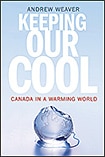“For Canadians, this is the best single book on our climate crisis and what we should do about it.”
Thomas Homer-Dixon on Andrew Weaver’s Keeping Our Cool
University of Victoria climatologist Dr. Andrew Weaver, Canada’s answer to James Hansen, continues to win rave reviews and political attention for his new book, Keeping Our Cool.
Weaver has been outspoken about the sorry record of Canada’s current Conservative government (“They were making policy without even consulting their environmental scientists.”) and highly critical of the government’s efforts to muzzle those in the scientific community (“It’s absolutely Orwellian what’s going on here in science in Canada.”)
He is also one of the clearest speakers on the actual risk of climate change (“People have simply no idea how serious this issue is.”)
We can’t recommend the book, or Weaver himself, too highly. And we will be bringing more – about him and directly from him in the future.
Subscribe to our newsletter
Stay up to date with DeSmog news and alerts







